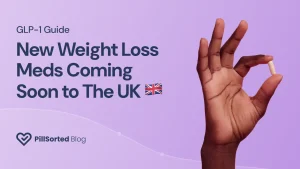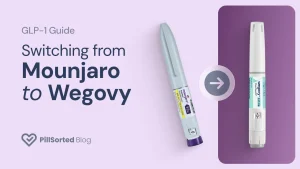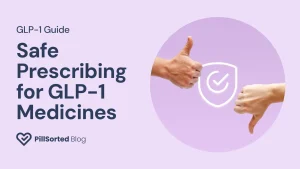What Happens When You Stop GLP-1s — And How to Prevent Weight Regain

GLP-1 medications like Wegovy, and Mounjaro have helped millions of people lose weight by reducing appetite and improving metabolic health. But what happens when you stop taking them?
It’s a question that more and more people are asking—and with good reason. Studies and real-world experience show that weight regain is common after treatment ends. Indeed, many recommend long-term treatment with GLP-1s in order to maintain weight loss and the improved health-related outcomes. It emphasises the importance of long-term lifestyle changes to support weight loss and maintenance.
In this post:
- The science
- Why Weight Regain Happens After Stopping GLP-1s
- What are your options if you have reached your target BMI with GLP-1 medications?
- Strategies to Prevent Weight Regain
- GLP-1s Are a Tool—Not a Shortcut
- FAQs
The science
This is a really important subject and there are lots of people studying this! Learning is ongoing but research is already pretty conclusive.
One of the largest and most robust studies is the SURMOUNT-4 trial. This study looked what happened when you stop taking tirzepatide (Mounjaro) after losing weight with it. Those who recevied the placebo (no active drug) on average experienced 14% weight regain whilst those who continued on Tirzepatide had a further average weight loss of 5.5%.
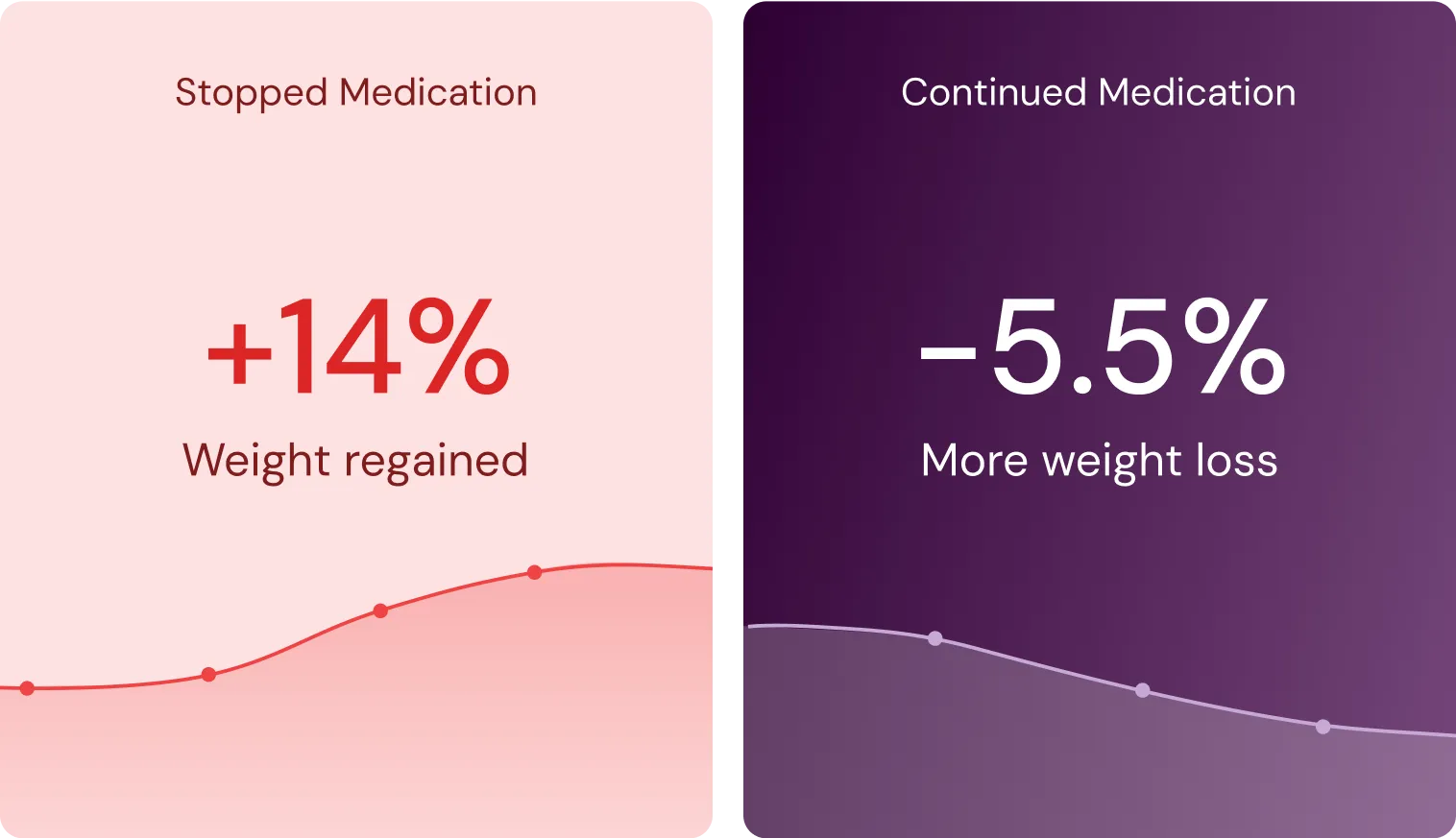
Another example is an extension of the STEP-1 trial, which randomised 1961 adults to either semaglutide or placebo for 68 weeks. Both groups had lifestyle interventions. At 68 weeks, treatment was stopped but a small group continued taking semaglutide for a year as part of an extension trial.
One year after stopping semaglutide 2.4 mg and lifestyle intervention, people regained two‐thirds of their prior weight loss, with similar changes in cardiometabolic variables.
Another recently published review (Wu et al., BMC Medicine, 2025 ) looked at a range of studies on this subject to provide an overview of what happens when these medications are stopped.
The key findings are eye-opening:
First month off: Weight loss continues briefly (~4 weeks).
By week 8: Regain starts.
Weeks 8–20: Rapid regain — often 2–3 kg above discontinuation weight.
After ~6 months: Regain levels off, but most patients keep some overall loss compared to where they started. Those taking GLP-1s were affected the most: they had the most pronounced regain.
This shows that lifestyle changes help… but they are often not enough: Even with ongoing diet/exercise programs, regain still occurred.
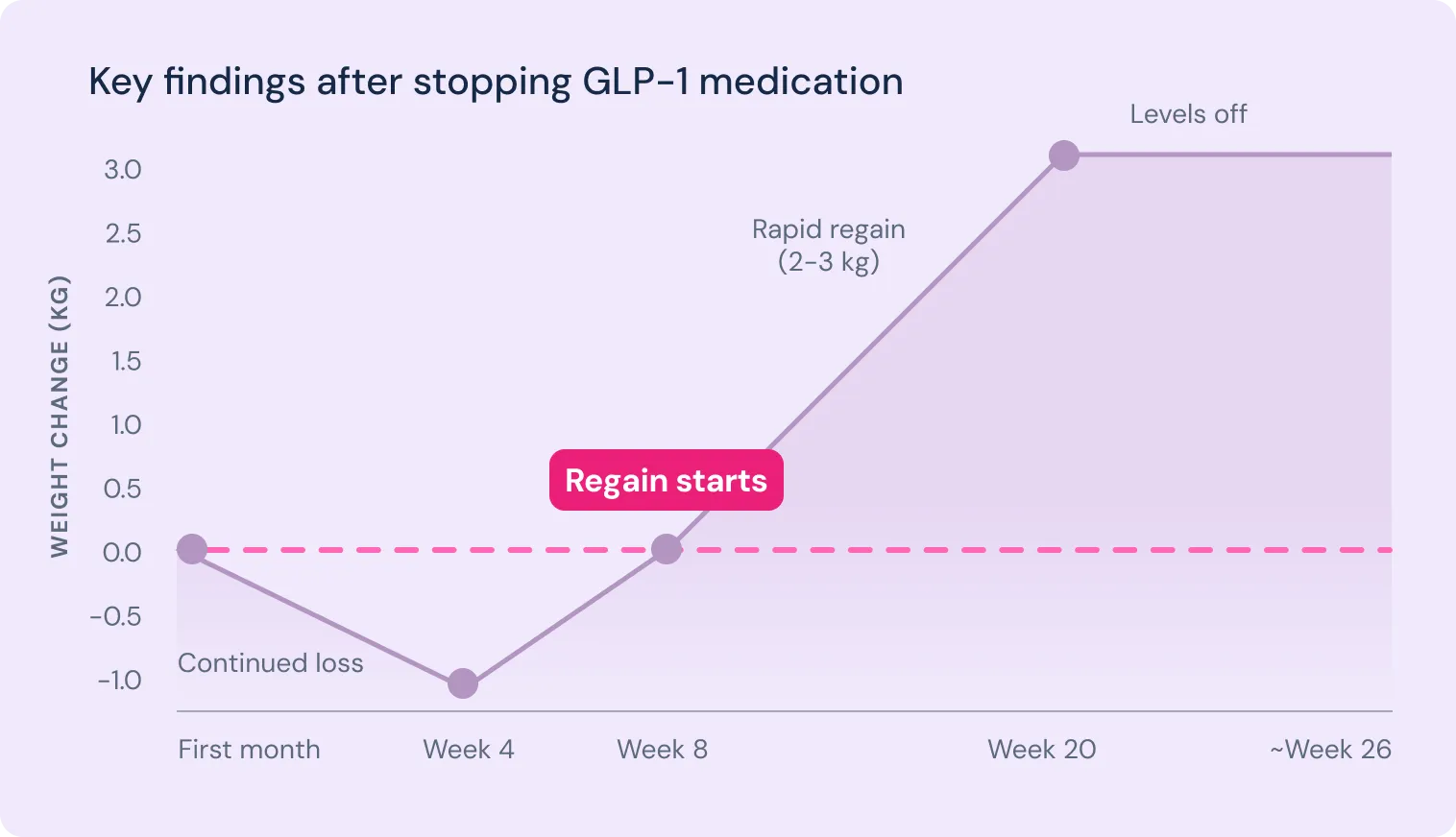
The takeaway from these studies: Obesity is a chronic condition — and without ongoing treatment (whether medication, surgery, or intensive behavioral support), biology will try to pull weight back up.
Why Weight Regain Happens After Stopping GLP-1s
GLP-1 medications work by mimicking a hormone that helps regulate appetite, blood sugar, and digestion. Once you stop taking the medication, your appetite and hunger hormones rebound, leading to:
- A return of appetite and food cravings
- Reduced satiety (feelings of satisfaction/fullness). Stomach emptying speeds back up.
- A drop in metabolic rate if muscle mass has decreased
- Emotional eating triggered by withdrawal-like changes in mood or reward processing
For many, it is likely that GLP-1 medications will be needed long-term alongside lifestyle and behavioural changes. Obesity is a chronic condition requiring chronic treatment. Weight loss with these medications does not equal a “cure”.
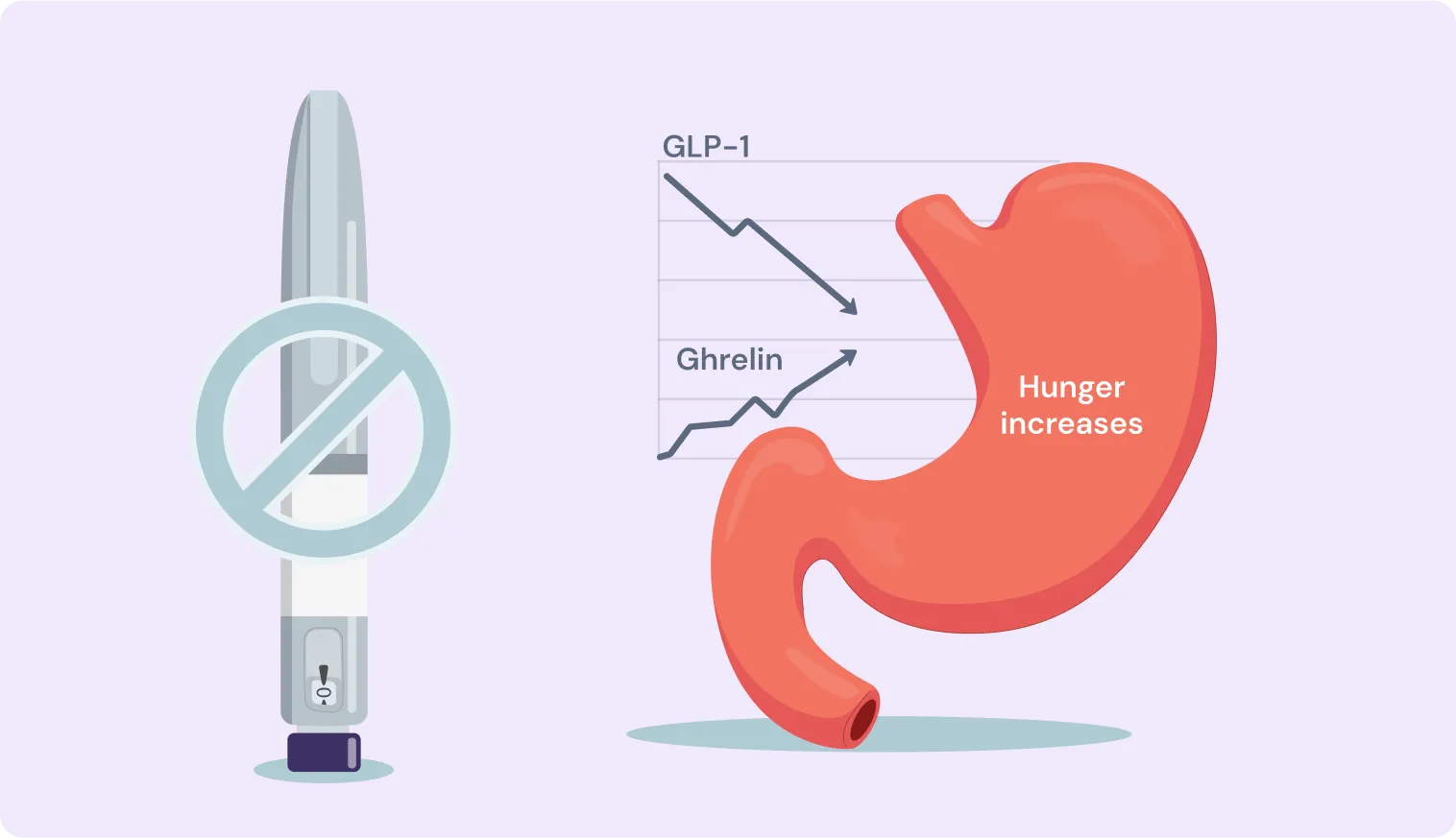
What are your options if you have reached your target BMI with GLP-1 medications?
There are several approaches to ongoing treatment once you have reached or are approaching your target BMI. There is no one single approach: individuals are unique with different lifestyles, health backgrounds and preferences. Weight and health maintenance therefore requires a tailored and personalised approach. This is why each patient at Pillsorted will be guided to create a personalised health plan to maintain your weight and health-related goals.
Some will continue to stay on the same dose of medication. Others may choose to lower the dose and others may choose to taper off completely. These are all valid approaches and we will work together to find the right solution, recognising flexibility between these “pathways”. There are a few key underlying principles.
- Many may need to continue taking GLP-1 medications in order to maintain their weight loss and health goals
- The doses of medication may stay the same or may be reduced to find the lowest effective dose that maintains weight and health
- Lifestyle and behavioural changes in the maintenance phase are crucial
- Any reduction or stopping of GLP-1 medication should be done under medical supervision, gradually
- Monitor weight and appetite vigilantly
Many people will find that they can use a reduced dose of GLP-1 medication once they have achieved their target BMI. Indeed, some may find that their nutritional requirements increase as they increase their physical activity. They therefore need to lower their GLP-1 dose to prevent further weight loss.
Others may find that their appetite and food noise increases as they decrease their dose. This is ok! It is about finding the right dose for that individual.
The most important thing is to be observant and highly attuned to your weight and appetite during the maintenance phase.
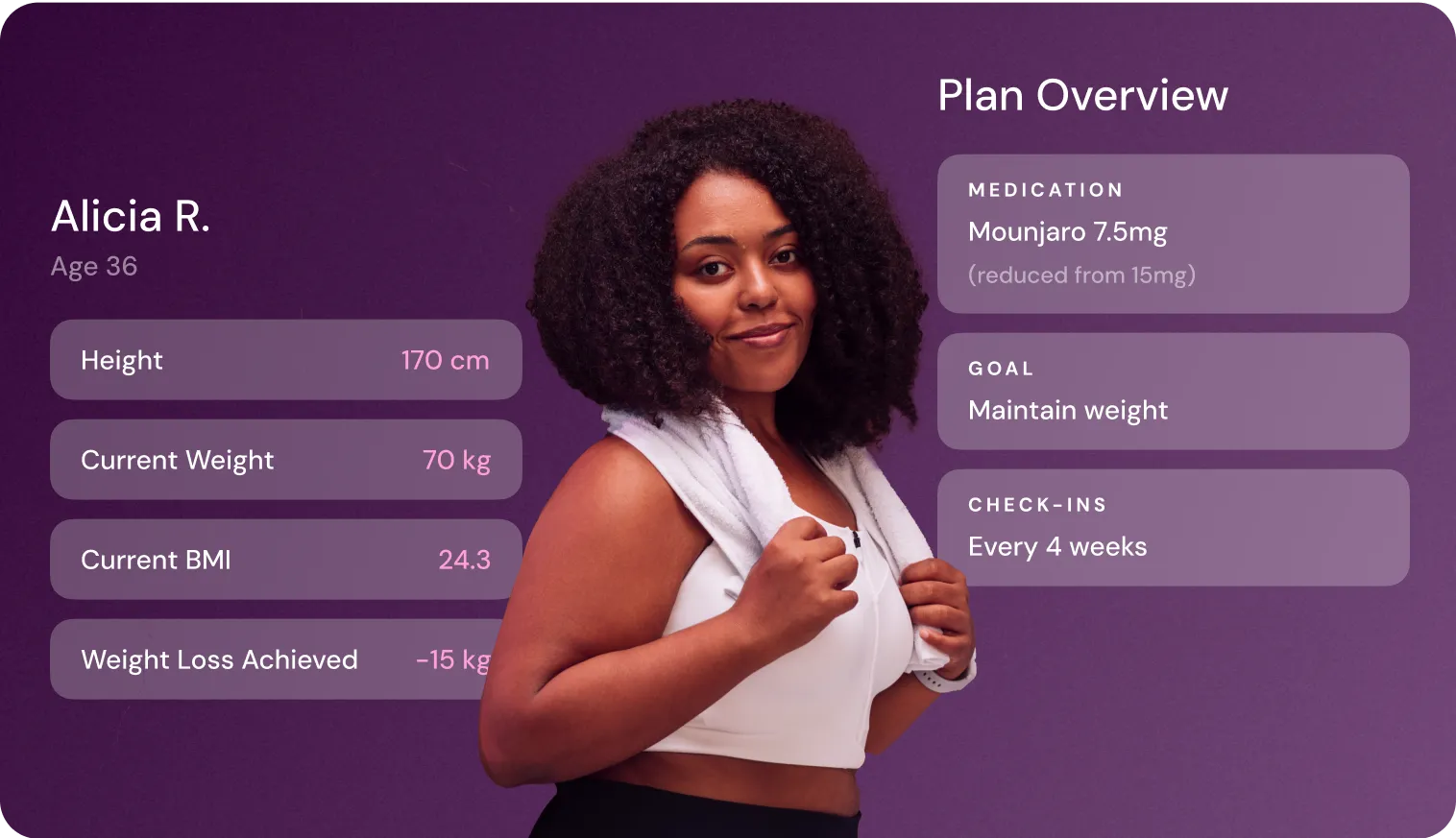
Strategies to Prevent Weight Regain
The key to lasting success isn’t just the medication—it’s the habits you build while on it. Here’s how to stay on track:
GLP-1s Are a Tool—Not a Shortcut
There’s no shame in using medication to improve your health. But it’s important to see GLP-1s as a springboard, not a destination. What you build while on them—your new habits, routines, mindset—will determine what happens when you reach maintenance.

FAQs
What are my GLP-1 options when I reach my goal BMI?
Every person is unique- it is important to develop a plan that is right for your health and preferences. That is why Pillsorted will work with you to create a personalised care plan. Broadly, your options are 1) continue on the same dose of GLP-1 2) gradually lower your dose of GLP-1 to find the minimum effective dose that works for you 3) taper off your dose of GLP-1. It may be that you move between the options with our guidance.
What if I choose to try stopping my GLP-1?
We are happy to support you to stop taking a GLP-1.
We would always recommend tapering the medication really gradually in order to avoid rebound effects. The “half-life” of tirzepatide (the amount of time it takes for the level in your body to half) is around five days. This means that it will be gone from your body in about a month. Whilst you are tapering off, you should monitor your weight and appetite closely and ensure you keep up with your healthy eating and exercise habits.
What if I stop my GLP-1 and then choose to re-start?
That’s ok! It will depend on how long you have been off the medication for and what happens to your weight. We may be able to re-start the medication at a lower dose. If off for too long a period, the medication may not be licensed for you as your BMI may not meet the criteria. We would have a personalised consultation with you to discuss the options.
I have read that some people try spacing out their doses or try using a smaller amount from their pen. Is this something you recommend?
This is not something we would recommend at Pillsorted. In spacing out the doses, it is hard to know the effective levels in your body and if they are consistent over time. This makes it difficult for you and us to know the right dose for you. Consistency has been a key part of the weight loss journey and this continues into maintenance.
PillSorted
PillSorted is a full-service pharmacy that delivers trusted pharmacy products, over-the-counter medications, and the prescriptions your doctor recommends, directly to your door. Your PillSorted pharmacist is happy to answer your questions about weight loss and potential treatment options at 0333 4050380 or help@pillsorted.com.

All third-party trademarks (including logos and icons) referenced by PillSorted remain the property of their respective owners. Unless specifically identified as such, PillSorted’s use of third party trademarks does not indicate or imply any relationship, sponsorship or endorsement between PillSorted and the owners of these trademarks.





























